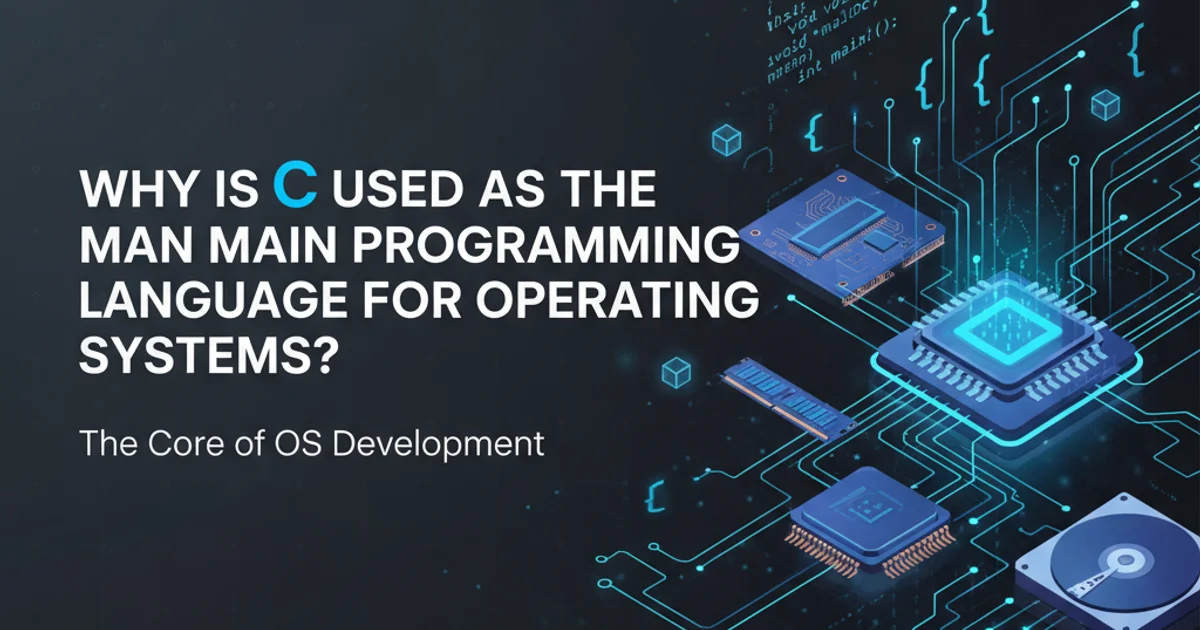Why is C used as the main programming language for operating systems?
Categories:
Why C Remains the Cornerstone of Operating System Development

Explore the fundamental reasons why the C programming language has maintained its dominance in operating system development for decades, from its low-level memory access to its efficiency and portability.
Operating systems are the foundational software that manages computer hardware and software resources, providing common services for computer programs. From the earliest days of computing, a particular programming language has stood out as the primary choice for their development: C. Despite the emergence of numerous modern languages, C continues to be the language of choice for writing kernels, device drivers, and other critical OS components. This article delves into the core attributes of C that make it uniquely suited for this demanding task.
Low-Level Memory Management and Hardware Interaction
One of C's most compelling advantages for OS development is its unparalleled ability to interact directly with hardware and manage memory at a low level. Unlike higher-level languages that abstract away memory details, C provides direct access to memory addresses through pointers. This capability is crucial for an operating system, which must meticulously control hardware registers, memory-mapped I/O, and buffer allocations to function efficiently. The OS kernel needs to precisely manage physical memory, set up page tables, and handle interrupts, all of which require fine-grained control that C readily offers.
#include <stdint.h>
// Example: Writing directly to a memory-mapped I/O register
// This address would typically be defined by hardware specifications
#define UART_DATA_REGISTER ((volatile uint8_t*)0x10000000)
void write_char_to_uart(char c) {
*UART_DATA_REGISTER = c; // Direct write to hardware register
}
// Example: Allocating memory for a kernel data structure
// In a real OS, this would involve more complex memory management routines
void* kernel_alloc(size_t size) {
// Simplified: In a real OS, this would interact with the memory manager
// and potentially return a physical or virtual address.
return (void*)0x20000000; // Placeholder for allocated memory address
}
C code demonstrating direct memory access and hardware interaction, crucial for OS development.
Performance and Efficiency
Operating systems are performance-critical software. Every millisecond counts, especially in real-time systems or high-throughput servers. C compiles directly to machine code, offering execution speeds that are often unmatched by languages requiring a runtime environment or virtual machine. Its minimalist design means less overhead, allowing developers to write highly optimized code that runs close to the bare metal. This efficiency is vital for tasks like context switching, interrupt handling, and scheduling, where any performance bottleneck can significantly degrade system responsiveness.
flowchart TD
A[C Source Code] --> B[C Compiler]
B --> C[Machine Code]
C --> D[Direct Hardware Execution]
D --"Fast, Low Overhead"--> E[Operating System Kernel]
F[Higher-Level Language] --> G[Compiler/Interpreter]
G --> H[Intermediate Code/Bytecode]
H --> I[Runtime Environment/VM]
I --> J[Hardware Execution]
J --"Slower, More Overhead"--> K[Application Software]Comparison of C's direct compilation to machine code versus higher-level languages with runtime environments, highlighting C's performance advantage for OS kernels.
Portability and Established Ecosystem
Despite its low-level nature, C is remarkably portable. The C standard defines a consistent language specification, allowing C code to be compiled and run on a vast array of different hardware architectures (x86, ARM, MIPS, etc.) with minimal modifications. This portability is essential for operating systems, which need to support diverse hardware platforms. Furthermore, C has an incredibly mature and extensive ecosystem, including robust compilers (like GCC and Clang), debuggers, and a wealth of existing libraries and tools. This established infrastructure significantly aids OS developers, providing reliable tools and a large community of experienced practitioners.
In conclusion, C's unique combination of low-level memory access, exceptional performance, and broad portability, backed by a mature toolchain, solidifies its position as the primary language for operating system development. While newer languages may offer safer abstractions or more modern features, none have yet matched C's fundamental suitability for the intricate and performance-critical task of building the very foundation of computing.